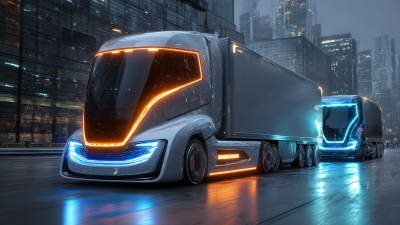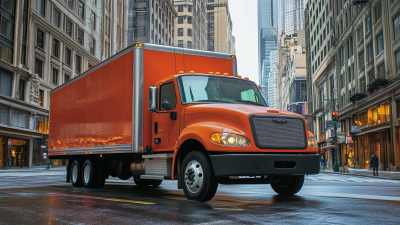Sorry. We did not find anything.
Electric Trucks Versus Traditional Trucks A Comprehensive Comparison Guide
As the transportation industry undergoes a significant transformation, the debate between electric trucks and traditional trucks has gained momentum. With the global shift towards sustainability, electric trucks are projected to make up 30% of the commercial vehicle market by 2030, according to a report by Bloomberg New Energy Finance. This shift is driven by advances in battery technology, government incentives, and the rising costs of diesel fuel. Traditional trucks, while still dominant, face increasing pressure from regulations aimed at reducing greenhouse gas emissions.

In this comprehensive comparison guide, we will explore the advantages and disadvantages of electric trucks versus traditional trucks, evaluating aspects such as cost, environmental impact, maintenance, and performance. Through this analysis, we aim to provide valuable insights to fleet operators and decision-makers navigating this evolving landscape.
Electric Truck Market Growth: Key Statistics and Projections for 2025 and Beyond
The electric truck market is experiencing remarkable growth, with projections indicating significant advancements by 2025 and beyond. Analysts predict that the global electric truck market will reach approximately $85 billion by 2025, showcasing a compound annual growth rate (CAGR) of over 25%. This growth can be attributed to increasing environmental regulations, rising fuel costs, and a growing demand for sustainable transport solutions. Major manufacturers are investing heavily in electric vehicle (EV) technology to stay competitive, leading to a wider variety of electric truck models entering the market.
Key statistics highlight the rapid adoption of electric trucks in logistics and transportation sectors. Reports suggest that by 2025, electric trucks could represent nearly 15% of the total truck market share, transforming logistics operations and reducing carbon emissions significantly. Furthermore, advancements in battery technology are expected to enhance electric truck performance, with increased ranges and quicker charging times making them more viable for long-haul applications. As consumers and businesses alike embrace greener alternatives, the electric truck market is poised for unprecedented growth, marking a pivotal shift in the future of transportation.
Cost of Ownership: Analyzing Long-term Financial Benefits of Electric vs. Traditional Trucks
When evaluating the financial implications of electric trucks versus traditional trucks, it’s essential to consider the long-term cost of ownership. While electric trucks often have a higher initial purchase price, potential buyers should examine the cumulative savings over time. Electric vehicles typically have lower maintenance costs due to fewer moving parts and reduced wear and tear. Additionally, these trucks benefit from cheaper "fuel" costs, as electricity tends to be less expensive than gasoline or diesel in many regions, resulting in potential savings that can accumulate significantly over years of operation.
Moreover, electric trucks may qualify for various incentives and rebates, further enhancing their appeal. Tax credits and grants aimed at promoting green technologies can decrease the effective purchase price, making electric options more financially viable. Furthermore, with the global push towards sustainable practices, businesses may find that adopting electric vehicles enhances their brand image and complies with increasingly stringent emissions regulations. In contrast, traditional trucks may face rising costs associated with fuel prices and maintenance, leading to a less favorable long-term financial outlook. By taking these factors into account, businesses can make informed decisions that align both their operational needs and financial goals.
Performance Comparison: Torque, Range, and Payload Capacities of Electric and Diesel Trucks
When comparing electric trucks to traditional diesel models, it's essential to analyze specific performance metrics such as torque, range, and payload capacities. Recent tests showcase the robust torque output of electric trucks, which translates to superior acceleration and towing capabilities. For instance, some new electric pickup models have demonstrated that they can outperform diesel counterparts under real-world conditions, maintaining consistent power while towing heavy loads.

Range is another critical factor; while diesel trucks generally offer longer driving distances on a single tank, advancements in battery technology are rapidly closing this gap for electric trucks. Manufacturers are introducing vehicles with ranges capable of meeting the demands of typical workdays. Moreover, payload capacities continue to evolve, with electric trucks showing impressive figures that compete closely with traditional models.
Tips: When considering a purchase, evaluate your typical towing and payload needs carefully. Opt for electric models if your operations include short-haul trips and require high torque. For long-haul operations or extensive driving distances, diesel might still hold an edge. Always stay informed about the latest advancements and models entering the market to make the best decision for your needs.
Environmental Impact: Carbon Emissions and Sustainability Metrics in Trucking Industry
The trucking industry is undergoing a substantial transformation as electric trucks emerge as a viable alternative to traditional diesel-powered vehicles. One significant area of comparison is their environmental impact, particularly in terms of carbon emissions and sustainability metrics. According to a 2023 report by the International Council on Clean Transportation (ICCT), electric trucks emit approximately 40% less greenhouse gas emissions compared to their diesel counterparts over their lifetime when considering the current energy mix in many jurisdictions. This reduction is critical in the fight against climate change, as transportation accounts for nearly 29% of total greenhouse gas emissions in the United States.
Moreover, the sustainability metrics of electric trucks extend beyond emissions. For example, a study by McKinsey & Company highlights that the lifecycle emissions of electric trucks can be further reduced if charged using renewable energy sources. In regions where over 70% of electricity is generated from renewables, electric trucks can achieve up to 80% lower lifecycle carbon footprints. Additionally, battery recycling technology continues to advance, promising to mitigate the environmental impact of discarded batteries in the long run. As the trucking industry evolves, the commitment to sustainability through electrification presents a transformative opportunity that aligns with global emissions reduction targets.
Electric Trucks Versus Traditional Trucks: A Comprehensive Comparison Guide
| Metric | Electric Trucks | Traditional Trucks |
|---|---|---|
| Average Carbon Emissions (g CO2/km) | 0 | 150-250 |
| Fuel Efficiency (mpg) | Equivalent to 7-10 | 6-8 |
| Battery Recycling Rate (%) | 95 | N/A |
| Noise Level (dB) | Low (60-70) | High (80-90) |
| Average Maintenance Cost ($/year) | 2,000 | 4,500 |
| Range on Full Charge/Tank (miles) | 200-300 | 400-700 |
| Average Charging Time (hours) | 1-2 (fast charging) | N/A |
Infrastructure and Charging: Current Challenges and Future Developments for Electric Trucks
As electric trucks gain traction in the transportation industry, the challenges surrounding infrastructure and charging remain significant hurdles. According to a report from the International Council on Clean Transportation (ICCT), to support a nationwide fleet of electric trucks, investment in at least 10,000 public charging stations will be required by 2030. This infrastructure gap poses a challenge for logistics companies trying to transition to electric fleets while ensuring reliability and efficiency in operations.

Moreover, the current charging technology is not yet optimized for heavy-duty vehicles. Most electric trucks take several hours to fully charge, which can cause delays compared to the quick refueling capabilities of traditional diesel trucks. A study from the Department of Energy indicates that new advancements in ultra-fast charging can cut this time down significantly, but widespread implementation is essential. Innovations such as battery swapping and integrated on-route charging systems are also emerging, promising to address these infrastructure limitations and set the stage for a sustainable future in electric trucking.
Related Posts
-

China's Premium Electric Trucks Your Reliable Global Partner in Innovation
-

Future Innovations in Best Electric Trucks Post 2025 Analysis of Emerging Technologies
-

Unlocking the Benefits of E Trucks: A Comprehensive Guide for Your Business
-

5 Compelling Reasons to Choose Ev Pickup for Your Sustainable Business Solutions
-

Benefits of Choosing Electric Car Brands for Sustainable Transportation Solutions
-

Ultimate Showdown of the Best New Electric Vehicles on the Market
